The picture of the Chicago Board of Trade building at night is via Wikipedia.
Of the names of the 1,036 communities, neighbourhoods, districts and suburban estates in Greater Chicago that have been identified to date, 195 (18.8%) are based, in whole or in part, on place names that can be found in Scotland, on Scottish family names, or on Scottish words. Of course, many of the names are used in other parts of the British Isles as well but at least 86 (8.3%) of these appear to be exclusively Scottish.
Neighbourhoods, subdivisions, districts and suburbs with names that occur only in Scotland and not elsewhere in the British Isles, and/or are definitely, or most probably, of Scottish origin are:
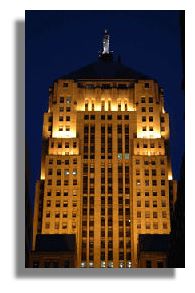 For comparability with other large cities around the world, Greater Chicago has been defined as the continuously built-up urban area surrounding the City of Chicago, known locally as "Chicagoland". This is a vast metropolis taking in communities in three states, and is the third largest by population in the United States (around 9,750,000 current estimate - nearly twice the population of Scotland!). The metropolis extends from Kenosha (Wisconsin), Antioch and Richmond in the north, to Crown Point (Indiana), Crete, Frankfort and Channahon in the south, and from Woodstock, Huntley and Sugar Grove in the west to Chesterton (Indiana) in the east.
For comparability with other large cities around the world, Greater Chicago has been defined as the continuously built-up urban area surrounding the City of Chicago, known locally as "Chicagoland". This is a vast metropolis taking in communities in three states, and is the third largest by population in the United States (around 9,750,000 current estimate - nearly twice the population of Scotland!). The metropolis extends from Kenosha (Wisconsin), Antioch and Richmond in the north, to Crown Point (Indiana), Crete, Frankfort and Channahon in the south, and from Woodstock, Huntley and Sugar Grove in the west to Chesterton (Indiana) in the east.
- Albany Park - there is an Albany Burn in South Ayrshire. Although Albany occurs in some English place names as well, the origin of the name of the Chicago neighbourhood is indirectly Scottish. According to the Encyclopedia of Chicago, streetcar magnate DeLancy Louderback, a native of Albany, New York, bestowed the name in the 1890s. Albany, the state capital of New York, had been named in 1664 in honour of the Duke of York and Albany, who later became James VII of Scotland and II of England. The Duke of Albany is a Scottish title given since 1398, generally to a younger son of the Scottish King. The noble title is derived from Alba, the Gaelic name for Scotland.
- Andrews and Hurds - Andrews and Hurd are both Scottish family names. Andrews is a Scottish family name from Caithness and is found today across Scotland. Hurds is not quoted in Black (1996), the authority on Scottish family names, but Hurd is said by Black to be a variant of Herd. Baron Hurd was English, however.
- < Ashburn Gresham and Ashburn Estates – there is a village in Highland called Ashburn, the only occurrence of the name in the British Isles. Gresham, on the other hand, is an English name.
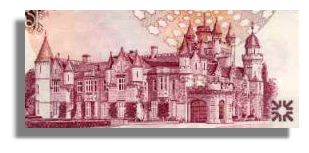
- Balmoral - the royal residence on the river Dee, Aberdeenshire, built for Queen Victoria. The graphic here (from a Scottish banknote) shows Balmoral Castle.
- Bannockburn (Stirling). The town of Bannockburn has special significance in Scottish history as it was the scene of King Robert the Bruce’s victory in 1314, which secured Scotland’s full independence from England for the next four hundred years. The suburb of Bannockburn, in Lake County, was established in 1924 by developer William Aitken, who intended the settlement to be an exclusive community for members of his bridge group and country club (Adam H Stewart, Encyclopedia of Chicago)..
- Beach Park (North Ayrshire, south of the town of Irvine). It may be pure coincidence, however, that the only place in the British Isles with this name happens to be in Scotland. Writing in the Encyclopedia of Chicago, Wallace Best states that "though containing neither a "beach" nor a "park," the community was ideal for vacations as well as permanent residency, because of its proximity to the Illinois Beach State Park, located directly east."
- Bernice (Argyll & Bute).
- Bonnie Glen - the name of this Glenview subdivision is clearly based on two well-known Scottish words: bonnie ('pleasing to the eye') and glen ('valley').
- Braeside (Aberdeen City and Inverclyde). The name of this Glencoe neighbourhood was most probably chosen because it is Scottish, 'brae' (pronounced 'bray') being a Scots word for a hill or the slope of a hill.
- Brisbane - there is a village in North Ayrshire called Brisbane Mains. Brisbane is a Scottish family name.
- Burns Harbor - Burns is a common Scottish family name, a sept of Campbell of Argyll. The most famous bearer of this name is Robert Burns, the Scottish poet.
- Burnside - the name of two places in Angus and one place in each of Fife, Moray, South Lanarkshire and West Lothian, 'burn' being a Scots word for a stream. The Chicago neighbourhood was actually named after a former Illinois Central Railroad company official and Civil War general, Ambrose Burnside, when a station was built in 1862 (Janice L. Reiff, Encyclopedia of Chicago). Burnside is a Scottish family name as well as a Scottish place name.
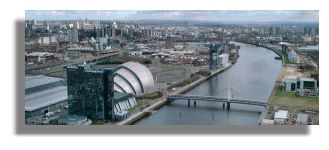
- Clyde - Scotland's best-known river, flowing through Glasgow, may well have been the inspiration for the name of this Cicero neighbourhood.
- Cragin and Belmont Cragin - According to the House of Names Heraldic website, Cragin is one of many variants of Craigie, a Scottish family name from Ayrshire. Black (1996), however, makes no mention of this Scottish sounding name. These Chicago neighbourhoods take their names from Cragin Brothers & Company, "who moved their tin plate and sheet iron processing plant near Whiskey Point." (Marilyn Elizabeth Perry, Encyclopedia of Chicago). The Belmont part of Belmont Cragin takes its name from Belmont Street, which commemorates the Civil War Battle of Belmont in Missouri in 1861.
- Crawford and Crawford Countryside - there are places in Scotland called Crawford, Crawforddyke and Crawfordjohn (South Lanarkshire), Crawfordton, Crawfordton Burn and Crawfordton Hill (Dumfries & Galloway), Crawford Hill (East Ayrshire) and Crawfordston (South Ayrshire). There are also a few places in northern England and Northern Ireland with Crawford as part of the name, probably having been taken there by Scottish settlers. Crawford (sometimes spelt Crauford) is a Lowland Scottish name. The name goes back to at least the 13th century. William Wallace's mother is believed to have been the daughter of Sir Hugh Crawford, Sheriff of Ayr. One wonders whether these Chicago neighbourhoods were named for Peter Crawford (c1795-1876), real estate speculator and homebuilder, who was born in Argyllshire, Scotland.
- Cummings Corners - there are places called Cummings Park in Aberdeen City, Cummings Hill in the Scottish Borders and Cummingstown in Moray, all based on this Scottish surname. The name has also travelled to northern England (Cumming Carr in Lancashire). Cumming is derived from Robert de Comyn, the Norman Earl of Northumberland, and has been associated with Scotland since the early part of the 12th century. The Comyns were once a powerful noble family but lost their lands through being on the wrong side in their rivalry with Bruce.
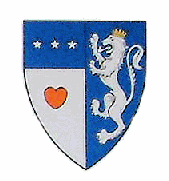
- Douglas and Douglas Avenue - there is a place in South Lanarkshire called Douglas - the original territorial base of the powerful Douglas family. There is also a suburb of the City of Dundee called 'Douglas and Angus' and numerous other places in Scotland with Douglas as part of the name. Places called Douglas are found in Ireland and on the Isle of Man as well, probably having been taken there by Scottish settlers. The graphic here is the coat of arms of the "Black" Douglases.
- Duncans Addition - Duncan is an ancient Scottish family name. The Duncan clan is descended from the medieval earls of Atholl, the name being an anglicisation of Donnachadh, from Gaelic donn (brown) and cath (war), suggesting the meaning 'brown warrior'.
- Dunning and Western Dunning - there is a place in Perth & Kinross called Dunning. According to the Encyclopedia of Chicago, these neighbourhoods were named after Andrew Dunning, a 19th century farmer, nurseryman and real-estate developer. In addition to Dunning being a place name in Scotland, it is also a Scottish family name.
- East Dundee and West Dundee - Dundee is Scotland's fourth largest city. These suburbs to the west of Chicago were apparently named in the 1830s as the result of a lottery, the winner being Alexander Gardiner, a young Scotsman who wished to honour his hometown in Scotland. West Dundee was incorporated in 1867, four years before East Dundee (Wikipedia articles on East and West Dundee).
- Elgin and South Elgin - Elgin is a town in Moray, about 40 miles NE of Inverness. These suburbs in Kane County owe their names to James T. Gifford and his brother Hezekiah Gifford, who travelled west from New York after hearing tales that the area was ripe for settlement. The brothers established Elgin in 1836, naming the settlement after the Scottish hymn 'The Song of Elgin' (Wikipedia article on Elgin, Illinois).
- Flossmoor and Flossmoor Highlands – According to the Illinois Lincoln Highway Coalition website, the name Flossmoor is Scottish in origin, meaning ‘dew on the flowers’ and ‘gently rolling hills’. Many of the street names reflect the Scottish theme. Examples include Alexander Crescent, Balmoral Crescent, Bonnie Brae Crescent, Braeburn Avenue, Braemar Road, Bruce Avenue, Burns Avenue, Douglas Avenue, Gordon Drive, Heather Hill Crescent, MacDonald Lane, MacFarlane Crescent, MacHeath Crescent, Scott Crescent, Sterling Avenue and Wallace Drive. John H Long, writing in the Encyclopedia of Chicago, states that "The U.S. Post Office selected the name Flossmoor from a list the Illinois Central had assembled through a contest to name the place." In a personal communication received from Kathleen Blaze Brown, a resident of Flossmoor, it was explained that the Scottish name was chosen to reflect the main purpose of the community - golf. In addition to a large number of the streets bearing Scottish family or place names, there are others connected with golf, such as Link and Caddy. One of the parks in Flossmoor is aptly called Highland Park.
- Gilmer - there is a Gilmerton in Edinburgh. According to Black (1996), Gilmer is a variant of Gilmour, a Scottish family name that can be traced back to the 12th century.
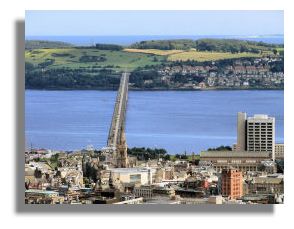
- Gladstone and Gladstone Park - there are places called Gladstone and Gladstone Boreland in South Lanarkshire, and Gladstone Farm in Renfrewshire. Gladstone is a Scottish family name, well established in Lanarkshire by the 13th century (Herbert de Gledstan was one of the signatories of the Ragman Roll). The most famous bearer of this name was William Ewart Gladstone (1809-1898), one of Queen Victoria's Prime Ministers. According to the Chicago Park District website, the Chicago neighbourhood of Gladstone Park was in fact named for the British Prime Minister, albeit indirectly. Although William Ewart Gladstone was born in Liverpool, his parents were both Scottish and he proudly claimed that "not a drop of blood in my veins is not Scottish."
- Glen Park (Renfrewshire). There is no evidence, however, that the name of this community in Lake County, Indiana, necessarily has a Scottish connection.
- Glencoe - this name is etched into the Scottish psyche as the bleak glen in the Highlands where, in 1692, a party of MacDonald men, women and children was treacherously massacred by the Campbells, who were acting under government orders. Adam H. Stewart gives the following account of the name of this Chicago suburb. "The origin of Glencoe's name remains shrouded in a variety of competing narratives. The most likely of these is that it is a combination of the geographic features of the wooded bluffs upon which the original town planners settled and the maiden name of former Chicago mayor Walter Gurnee's wife. While there appears to be no direct connection with the Scottish town of the same name, the north suburban village adopted the elder town's seal when it incorporated in 1869" (Encyclopedia of Chicago).
- Glendale (Highland). A remarkably large number of American cities have communities/suburbs called Glendale, a name simply meaning 'valley'. The unusual feature of this name is that it is a tautology - 'valley' features twice, first in Gaelic (gleann) then in Norse (dalr). The suburb of Glendale Heights, on the other hand, definitely has no connection with Scotland (see Glendale Heights in the final section).
- Glenwood (Aberdeenshire).
- Graham Woods - there are many places in central and southern Scotland beginning with Graham from the surname; also a few just over the border in Northumberland and Cumbria. Graham is a Scottish family name, the clan being descendants of an Anglo-Norman family that settled in Scotland (particularly the border areas) in the early part of the 12th century. As noted by Scarlett (1975, p. 69), "in 1606 an entire sept of Cumberland Grahams was "transported" to Roscommon in Ireland for being troublesome on the Border." The most famous bearer of the name was the brilliant soldier James Graham, the 1st Marquess of Montrose (1612-50).
- Grant Village - there is a Grant in Perth & Kinross. There are also many other places in Scotland with this Scottish family name as part of the name, for example Grantlodge, Grantshouse and Grantown-on-Spey. Places beginning with Grant can also be found in England but in the majority of these instances 'Grant' has a different meaning. According to Scarlett (1975), the Scottish family name of Grant was first recorded in 1258.
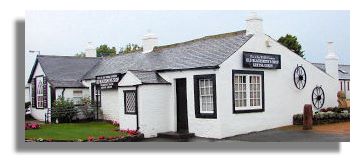
- Gretna - a town in Dumfries & Galloway. The nearby village of Gretna Green is world famous for the old blacksmiths' shop (see graphic) where many runaway marriages were performed owing to a 1753 Act of Parliament which applied in England and Wales but not in Scotland concerning parental consent to the marriage of under 21-year-olds.
- Hamilton Park - there is a large town in South Lanarkshire called Hamilton. The name Hamilton has been associated with Scotland since the 13th century, having been taken there from Leicestershire in central England by Walter Fitz Gilbert (Sir Walter de Hameldone). According to the Penguin Dictionary of British Place Names (Room, 2003), Hamilton means 'farmstead in broken country' in Old English. Hamilton is one of the most frequently recurring Scottish place names around the English-speaking world. According to the Chicago Park District website, Hamilton Park was one of ten parks created in 1904, and was the only one named for a national political figure, Alexander Hamilton (1755-1804), advisor to George Washington and first secretary of the U.S. Treasury, who was killed in a duel. Alexander Hamilton was born in Nevis, Leeward Islands, West Indies, "out of wedlock to James A Hamilton, the fourth son of a Scottish laird, and Rachel Faucett Lavien, of part Huguenot descent. There is, however, some evidence that Hamilton's biological father may have been a Nevis merchant named Thomas Stevens." (Wikipedia article on Alexander Hamilton).
- Highland - the northernmost county of mainland Scotland with its unofficial capital at Inverness (see below). The Indiana community of Highland appears to have been named for largely descriptive reasons: "In 1883, the Chicago & Atlantic Railroad tracked through the area. The railroad surveyors, after surveying miles of swamp, called the sand ridge 'Highlands'." (Jennifer Mrozowski, Encyclopedia of Chicago).
- Highland Glen, Highland Hills, Highland Lake and Highland Park - all possibly evoking the Highlands of Scotland (especially the Algonquin neighbourhood of Highland Glen), though information on the origin of the names of these suburbs and neighbourhoods has not been recorded.
- Hometown and Homewood - the reason for the names of these suburbs in Cook County has not been found but they may well refer to an individual with the Scottish family name of Home, a variant of Hume.
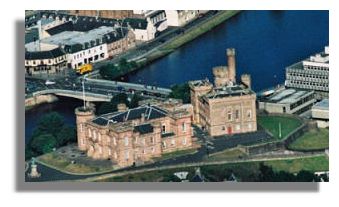
- Inverness (a small city in Highland). This suburb in Cook County is one of the few places in Greater Chicago that was definitely named for a place in Scotland as opposed to a Scottish family name. The following account of the origin of the name is given in the Encyclopedia of Chicago: "When Arthur T. McIntosh, a developer from Kenilworth [Illinois], first visited the area in the 1920s, the land reminded him of Scotland, and he named it after the capital of the Scottish Highlands." (Ronald Martin, Encyclopedia of Chicago). The picture of Inverness castle and the river Ness in Scotland is courtesy of the Scotavia Web site.
- Irving Park, Old Irving Park and Irving Woods - Irving is a Scottish family name. The Chicago neighbourhood of Irving Park was in fact named for a Scottish American, as explained in the following quotation from the Encyclopedia of Chicago. "The original name chosen for the new suburb was 'Irvington' after the author Washington Irving, but it was discovered that another town in Illinois had already used the same name, so the name of Irving Park was adopted." Washington Irving (1783-1859) is best known for his short stories 'The Legend of Sleepy Hollow' and 'Rip Van Winkle'. His father was born in Shapinsay, Orkney Islands. It is interesting to note that some Orcadians claim a link between the Rip van Winkle story and the local folklore of creatures called 'trows'.
- Ivanhoe - Ivanhoe is the title of one of Sir Walter Scott's novels but the setting for this novel was Medieval England, which accounts for the rather 'un-Scottish' name. There appear to be two communities in Greater Chicago called Ivanhoe (a city in Lake County, Indiana and a neighbourhood of Riverdale, Cook County). The well-known Chicago suburb of Kenilworth (another English place name) may also have been named for Sir Walter Scott's novel with that title, especially since there is an Abbotsford Street in the suburb. The names of Sir Walter's literary works or characters in his novels and poems have been used amazingly frequently as place names throughout the English-speaking world (see also Melrose, Midlothian, Montrose, Ravenswood and Woodstock below).
- Justice - Black (1996) states that the family name is from the office of magistrate, quoting a reference in 1474 to an individual named Justice in Perthshire. The origin of the name of the Chicago suburb is unclear according to the Encyclopedia of Chicago. It could have a link with Scotland if the name refers to an individual rather than judicial proceedings or divine retribution.
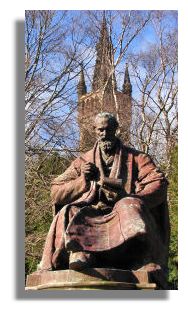
- Kelvyn Grove (a district of the City of Glasgow, spelt Kelvingrove). This Chicago neighbourhood is now better known as Hermosa, Spanish for ‘beautiful’. It is interesting to note that other neighbourhoods with Scottish names are located nearby to the north (Cragin, Dunning, Montrose and Irving Park). Mary Elizabeth Perry, writing for the Encyclopedia of Chicago, notes that “Scottish immigrants settled here in the 1880s, calling the area of woods and prairie Kelvyn Grove after the eighth Lord Kelvyn.” This explanation is likely to be incorrect (see Kelvyn Park below for a more likely origin of the name). The graphic here shows his statue beside the university not far from the river.
- Kenwood - although Kenwood is an English family name, there appears to be a definite Scottish connection in the case of the Chicago neighbourhood. Max Grinnell, writing in the Encyclopedia of Chicago, attributes the name to an early resident, Dr. John A. Kennicott, who built his home near the Illinois Central Railroad tracks at 48th Street, naming it Kenwood "after his ancestral land in Scotland." The name was adopted by the Illinois Central Railroad for the local station. Dr Kennicott was born in New York. Since Kennicott is an English family name, the Chicago neighbourhood of Kennicott Place cannot be claimed for Scotland.
- Leithton - the name of this community in Lake County possibly recalls Leith, Edinburgh's docklands.
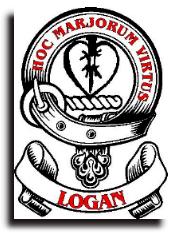
- Logan Square (Dumfries & Galloway and East Ayrshire). Logan is a Scottish family name, most probably derived from the place name in Ayrshire. According to Wikipedia, "the community area and neighborhood are named for General John A. Logan who served in the Civil War, and later in Congress."
- Long Beach - there is a place in Scotland called Longbeach, west of Dumfries - the only place in the British Isles with this name. This does not guarantee, of course, that the Chicago suburb was actually named with this place in mind.
- Lotus Woods - there is a village called Lotus and a Lotus Hill in Dumfries & Galloway, the only occurrence of this name anywhere in the British Isles. Of course, it does not necessarily follow that the Chicago suburb was named for one of these places in Scotland.
- Matteson - probably a corrupted spelling or a variation of Matheson, a Highland clan whose origins go back to at least the 13th century. The Chicago suburb was apparently named in the mid-1850s by German settlers in honour of the then Governor of Illinois, Joel Matteson (Ian McGiver, Encyclopedia of Chicago).
- McCook - an old surname in the Kintyre and Arran regions of western Scotland. "The village's name probably honors Santa Fe railroad director John James McCook." (Ronald S. Vasile, Encyclopedia of Chicago).
- McCool - a Scots-Irish family name, one of the many corrupt forms of Macdougal, according to Black (1996), the authority on Scottish family names.
- McCormick Place - a Scottish family name meaning 'Son of Cormac', found in Scotland from the 12th century onwards.. Often spelled MacCormack, the family is a sept of two clans: Buchanan and MacLaine of Lochbuie. McCormick is also claimed as an Irish name.
- McCullom Lake - McCullom is one of the variants of the Scottish family name MacCallum, which is derived from the Gaelic 'Mac Ghille Chaluim', 'son of the servant of Calum'. Clan MacCallum and Clan Malcolm are closely related.
- McHenry - a Scottish family name meaning "Son of Henry" found in Scotland from the 14th century to the present day. In the USA it is regarded as being a Scots-Irish name. The Chicago suburb was named for Major William McHenry, "an old Indian fighter" (Wikipedia).
- McKinley Park - this Chicago neighbourhood was named for the park, which in turn had been named for President William McKinley, 1897-1901, the 25th U.S. president, after his assassination (David M. Solzman, Encyclopedia of Chicago). According to the House of Names Heraldic website, the McKinleys originated in Perthshire.
- McQueen - the name of a Scottish clan originating in the 15th century. The identity of the McQueen whose name was bestowed on this suburb has not been established.
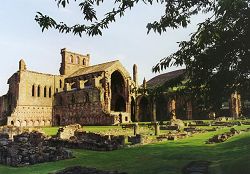
- Melrose Park - the market town of Melrose is situated in the Scottish Borders, close to Abbotsford, Sir Walter Scott's residence. Melrose has proved to be one of the most popular Scottish place names taken to other parts of the world. The reason for the name of the Chicago suburb is unclear but the origins of the community date back to 1873, with 'Park' being added to the name in 1894 (Encyclopedia of Chicago). The illustration here shows Melrose Abbey.
- Midlothian - the region of Scotland in which Edinburgh is situated. The following account explains the origin of the name of the Chicago suburb: "Midlothian was first called Rexford Crossing and was a milk stop where the Rock Island line crossed Crawford Avenue. The Midlothian Country Club was founded in 1898 on the rolling landscape of the Tinley Moraine. (The name Midlothian is a reflection of the Scottish origins of the game of golf, in that it came from Sir Walter Scott's novel 'The Heart of Midlothian'.)" (Dave Bartlett, Encyclopedia of Chicago).
- Millburn (Aberdeenshire, Dumfries & Galloway, Highland, Shetland Islands, South Ayrshire, South Lanarkshire and West Dunbartonshire). The following entry in the Encyclopedia of Chicago gives a full account of the evolution of the name of this suburb in Lake County. "In the late 1830s, German and Scottish settlers established the small agricultural community that would later become Old Mill Creek. Jacob Miller built a sawmill and gristmill along a tributary of the Des Plaines River, naming it Mill Creek. In 1838, the Strang brothers, originally from Scotland, traveled from Canada to Illinois in search of work on the Illinois & Michigan Canal. They founded a small settlement near Mill Creek known as Strang's Corners, which served as the area's only commercial center. The name was later changed to Millburn, "burn" being the Scottish word for creek" (Elizabeth S. Fraterrigo).
- Montrose (a town in Angus). One of the reasons for the popularity of the name Montrose throughout the English-speaking world may have to do with Sir Walter Scott's novel 'The Legend of Montrose', published in 1819. Alternatively, the name of the Chicago neighbourhood may honour the 1st Marquis of Montrose, a Covenanter who in 1638 pledged to defend the Presbyterian Kirk of Scotland against King Charles I who was attempting to impose Anglicanism on the Scottish people.
- Moreland - there is a place in Perth & Kinross with this name. However, as a surname, Moreland is considered to be an English family name.
- Naperville - According to Wikipedia, this suburb's name is attributed to its founder, Joseph Naper (1798-1862), shipbuilder, politician and businessman and a native of Vermont. The House of Names Heraldic website considers Naper to be a variant of Napier, a Scottish family name from Perthshire.
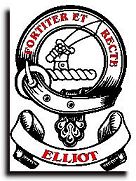
- New Elliott - there is a place called Elliot in the Scottish county of Angus. Elliot / Elliott is a Scottish family name derived ultimately from the Old English Ælfwald, a common Saxon name on the Scottish Borders which was the original home of the Elliots. The Elliots later settled in Forfar (whence the modern place name in Angus) before heading south again, this time to Liddesdale where, by the late 16th century, "they had the doubtful honour of heading, with the Armstrongs, the list of the most unruly of the Border clans." (Scarlett, 1975, p. 60).
- New Lenox - there is a Lennox Tower in the City of Edinburgh, Lennox Plunton in Dumfries & Galloway, Lennox Forest and Lennoxtown in East Dunbartonshire and Lennoxlove in East Lothian, all based on this Scottish surname. The Chicago suburb was "…named after Lenox, New York, the native home of the first township supervisor, J. Van Dusen" (Sarah S. Marcus, Encyclopedia of Chicago), making the connection with Scotland a remote one.
- Noble Square - there are places in Scotland called Noblehall (Scottish Borders), Noblehill (Dumfries & Galloway), Noblehouse (Scottish Borders) and Nobleston Wood (West Dunbartonshire), all possibly based on the Scottish family name of Noble. The same is true for England (the family originated in Cumbria but Noble is today more Scottish than English). Black (1996), the authority on Scottish family names, states that an English family named Noble settled in East Lothian at the end of the 12th century and that there has been a long history of Scottish Nobles since then to the present day. In Scotland, Noble is a sept of Clan Mackintosh.
- Philip Murray Homes - Murray is one of the best known Scottish family names, derived from the name of the area (Moray) in which the Pictish founder of the clan was granted land. Examples of places in Scotland based on this name include Murray's Hill (Perth & Kinross), Murrayfield (Edinburgh) and Murraythwaite (Dumfries & Galloway). The name has also travelled to England, e.g., Murray's Rock in Devon and is claimed as an Irish name as well.
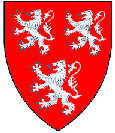
- Ross - Places called Ross can be found in the Scottish Borders, Dumfries & Galloway, Highland and Perth & Kinross. There are also many other places throughout Scotland that have Ross as part of the name. However, the same is true for England (especially Cornwall) and Ireland, though less commonly so than for Scotland. Ross is of course a fairly common Scottish family name originating nearly 900 years ago from two very different sources: Yorkshire in northern England (the Ayrshire Ross's) and that part of the Highlands of Scotland once known as Ross-shire. Since most places are named for individuals rather than towns and villages, the chances are high that the Chicago suburb in Lake County, Indiana has a Scottish connection.
- Spaulding - Spalding, an English town, gave rise to the Scottish surname. No information has been found on the origin of the name of this community in Cook County.
- Stewart Ridge - there is a Stewarton in Argyll & Bute, Scottish Borders, Dumfries & Galloway and East Ayrshire, plus numerous other place names throughout Scotland and parts of England and Northern Ireland that are based on the Scottish surname of Stewart. The Stewarts are descended from a Breton, Alan Fitzflaald, the crown of Scotland being brought to his descendants by Walter (1293-1326), fifth Steward of Scotland, whose son became King Robert II. The last of the Stewarts was Queen Anne (1665-1714).
- The Coves - the only occurrence of this name in the British Isles is in Scotland (a section of the coast south of Kilberry in Argyll & Bute). This Algonquin neighbourhood may have been named for purely descriptive reasons, however.
- Winfield (Scottish Borders). However, Winfield is also an English family name. There are two communities in Greater Chicago with this name: one in DuPage County, Illinois and the other in Lake County, Indiana. It is tempting to speculate that the name of the suburb in DuPage County honours General Winfield Scott, who was a national hero at the time (1854) when the name first appeared on maps. No reason has been found for the naming of the gated community in Indiana, which incorporated as recently as 1993.
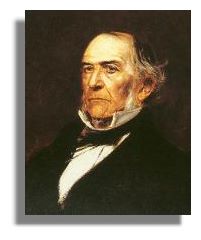
Some of the following districts, neighbourhoods, subdivisions and suburbs are also likely to have a direct or indirect Scottish connection but these names tend to be used in other parts of the British Isles as well, while at least two of them could be German or French:
- Addison and South Addison - Addison is considered to be both a Scottish and an English family name, not uncommon, says Black (1995), in eastern counties from Linlithgow to Aberdeen. It is derived from "son of Addie", which is a diminutive of Adam. The only place in the British Isles called Addison is in the northern English town of Gateshead, Greater Newcastle-upon-Tyne, while perhaps the most famous bearer of the name, Joseph Addison, the 18th century essayist and publisher, was also English. One wonders whether these Chicago suburbs in DuPage county, like Addison Street in Chicago itself, were named for Thomas Addison (1793-1860), an English doctor who discovered Addison's Disease, in which event there would be no connection with Scotland.
- Avondale (Shetland Islands) also in England and Ireland.
- Claremont Cottages - there is a Claremont in Fife and a Claremont Park in Edinburgh but places with Claremont as part of the name are found in England as well, including the well-known Claremont Estate near Esher, Surrey, while County Clare in Ireland is another possible source for the name.
- Covington Lakes - there is a place in South Lanarkshire called Covington, as well as in Cambridgeshire, England.
- Gibson - a sept of the Buchanan clan, presumably meaning "son of Gibb". Gibson occurs only in northern England as an element in place names, but these names may well be traceable, ultimately, to Scotland. No information has been found on the origin of the name of this community in Lake County, Indiana.
- Glenview and Glenview Countryside - there is a village in Argyll & Bute called Glenview. However, there is also a luxury hotel in County Wicklow, Ireland with this name and other references to the name are also likely to be found in Ireland since 'glen' is the Gaelic word for 'valley'. There is no evidence that these communities were necssarily named with Scotland in mind. According to the Village of Glenview website, Glenview was originally called South Norfield, then for a time North Branch. In 1878, Fred Hutchings named it Oak Glen but another designation had to be found since the local railway company already had a stop by that name. Hutchings (after the donor of the land) and Barr (after a railway superintendent) were considered, but Glenview was chosen in the end.
- Grayland, Graymoor and Grayslake – there is a Dunhead of Gray and Mains of Gray in Dundee City, as well as numerous other references to Gray as part of place names in both Scotland and England. As a family name, Gray appears to be more Scottish than English, which greatly increases the chances of a connection with Scotland in the case of some or all of these Chicago communities. The Chicago neighbourhood of Grayland in Irving Park community was named after John Gray, a farmer and businessman who settled in the Irving Park area in 1837. See: Chamberlin, Everett. “Chicago and its Suburbs”, 1874; and Andreas, A. T. “History of Cook County”, 1884 (listed under Jefferson Township--Grayland). Both books are available online in HeritageQuest. (Information supplied by Susan Perry, Chicago, IL, in a personal communication received on 15 January 2008). The Lake County suburb of Grayslake (incorporated in 1895) was named for William M. Gray, an 1840s settler who was born in Massachusetts (Craig L. Pfannkuche, Encyclopedia of Chicago). Information on the origin of the name of the neighbourhood of Graymoor near Flossmoor has not yet been found.
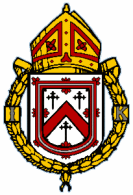
- Kennedy and Kennedy Park - there is a Kennedy's Cairn and Kennedy's Corner in Dumfries & Galloway and Kennedy's Pass in South Ayrshire, Galloway being the original territorial base of the Kennedy family. Kennedy is an ancient Scottish family name, though there are many Irishmen with this name as well. The origin of the name is Gaelic, 'ceannaideach' (ugly head). The graphic shows the coat of arms Bishop James Kennedy, the last to govern the diocese of St. Andrews after the Reformation.
- Lynwood (Scottish Borders, spelt Lynnwood) there is also a Lynnwood in Cumbria. Lynwood is a fairly common name in American cities. No explanation has been found for the origin of the name of this suburb in Cook County.
- Lyons - there are several places in Scotland with Lyon as part of the name (Lyoncross in East Renfrewshire, Lyonshield in North Ayrshire, Lyonston in South Ayrshire and the River Lyon and Glen Lyon in Perth & Kinross). These names refer, quite possibly, to the Scottish family of Lyon or Lyons. However, since the name is of Norman origin, it also occurs widely throughout England. As pointed by Ronald S. Vasile, the origin of the name of the suburb in Cook County is uncertain but "local lore suggests a relation to Lyon, France, another town at the confluence of two bodies of water." (Encyclopedia of Chicago).
- Marshall Square - there is a Marshall Moor in Renfrewshire, but places with Marshall as part of the name are quite common in England. According to the Chicago Public Library Marshall Square Branch webpage, James A. Marshall, secretary of the Chicago Real Estate Board (for whom Marshall Boulevard was named), came to Chicago in 1832 (Wikipedia article on South Lawndale, Chicago). Marshall is a Scottish family name (a sept of Clan Keith) but is also an English name from Wiltshire.
- Miller - there is a Millerhill in Midlothian and Millerston in Glasgow plus numerous other places in Scotland with Miller as an element in the name, but this is also the case in England. An occupational name, Miller could be either Scottish or English, not to mention anglicisations of German or Dutch names. The Scottish Millers are a sept of the MacFarlanes.
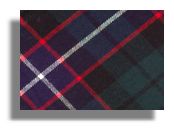
- Mitchells - there is a Mitchell Hall in East Lothian, a Mitchell Hill in Dumfries & Galloway and the Scottish Borders, Mitchellhill in Aberdeenshire and Mitchellslacks in Dumfries & Galloway. Place names based on the surname Mitchell are even more numerous throughout England, including Mitchell itself in Cornwall. The chances are nevertheless high that the Chicago neighbourhood could have a link with Scotland since Mitchell is a Scottish family name, the family being a sept of Clan Innes. The name is, however, also commonly found in England and Ireland. The graphic shows the Mitchell tartan.
- Munger - there is a Munger Skerries off the Ness of Sound, Shetland Islands. However, Munger is also a German family name and, considering the large number of German settlers during the 19th century, a settler with this name is a more likely source for the etymology of this community in DuPage County.
- Old Mill Creek - there is a place called Old Mill in Highland as well as in four English counties. The origin of the name of this Chicago suburb is virtually the same as that of Millburn (see above). Mill Creek took its name from the mills built by Jacob Miller (ancestry not reported - could be Scottish, English or German) in the 1830s, 'Old' being added to the name when the community incorporated in 1959 (Encyclopedia of Chicago).
- Prestwicke - one wonders whether the name of this Algonquin neighbourhood was intended to recall either the town of Prestwick in South Ayrshire (the site of a major international airport), or the suburb of Prestwick in the Greater Newcastle-upon-Tyne area in northern England.
- Ravenswood, Ravenswood Gardens and Ravenswood Manor - there is a Ravenswood in the Scottish Borders near Melrose and therefore close to Sir Walter Scott's residence, 'Abbotsford'. However, there is also a village with this name in West Sussex, England. A Scottish connection becomes a distinct possibility since this name occurs in Sir Walter Scott's 'The Bride of Lammermoor'.
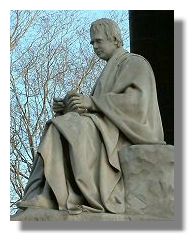
- Scottsdale - Scott is a common Scottish surname, originating in the Scottish Borders. As Black (1996) points out, however, there are more people with this Border Scottish surname in Northumberland than in the whole of Scotland. There are also many places in England with Scott as part of the name. Scottsdale, for instance, is the name of a place in Somerset. The surname 'Scott' has nevertheless consistently appeared among the top 9 to 13 most numerous family names in four surveys conducted in Scotland between 1858 and 1976. Surveys in England, on the other hand, place Scott in roughly the 40th position, though their numbers would exceed those in Scotland by virtue of the sheer size of England's population. Scotland's most famous Scott is of course the 19th century novelist and poet Sir Walter Scott - that's his statue in Edinburgh shown here.
- # Solon Mills – there are places in the Western Isles called Solon Beag and Solon Mór but Solon is considered to be an Irish family name from County Mayo. Solon was also the name of a famous Ancient Greek lawgiver and poet who is credited with laying the foundations for democracy in Athens.
- Sunnyside (Aberdeenshire, City of Glasgow, Dumfries & Galloway, East Ayrshire, East Lothian, Fife, Perth & Kinross, North Ayrshire, Orkney Islands, Scottish Borders, South Lanarkshire) also in England but not as commonly as in Scotland which probably says something about the premium placed on sunshine in Scotland!
- Swift - Swift is a Scottish as well an English family name. Black (1996) gives references going back to 15th century in Scotland while in England the name goes back even further.
- Whiskey Point - this Chicago neighbourhood takes its name from the intersection of Armitage and Grand Avenues where, in the 1830s, a saloon was opened by George Merrill to cater for farmers taking their produce to the city. Whiskey comes from the Gaelic 'uisge beatha' - the 'water of life'. In Scotland, the spelling is always 'whisky' in contrast to Ireland and the U.S. where the conventional spelling is 'whiskey'.
- Wilson - a reference, no doubt, to someone bearing the surname Wilson. Several places in Scotland use this name. The list includes Wilsonhall (Angus), Wilson Burn and Wilson's Pike (Scottish Borders), Wilson's Noup (Shetland Islands) and Wilsontown (South Lanarkshire). Wilson is found even more commonly in England, including the town of Wilson itself in Herefordshire and another in Leicestershire. The Scots Wilsons are a sept of Clan Gunn and now have their own family tartan. There appear to be two communities called Wilson in the Greater Chicago area: one in Lake County, Illinois and the other in Porter County, Indiana.
A third category of local names comprises places that definitely exist in Scotland, but there is nothing obviously "Scottish" about them. In these instances, the likelihood that the Greater Chicago counterpart was named for Scotland is greatly reduced because these names are far more commonly associated with other parts of the British Isles. Most of the names of these localities have an 'international' flavour and several may simply have been borrowed from other American cities and towns.
- Archer Heights - there is an Archer Beck in Dumfries & Galloway and Archerfield in East Lothian, but the name Archer occurs more frequently in English place names. According to Wikipedia, Archer Heights takes its name from the main arterial street, Archer Avenue (formerly Archer Road), which in turn was named after the first commissioner of the Illinois and Michigan Canal, William Beatty Archer. Archer is an English family name from Wiltshire.
- Armour Square - Armour is considered to be an English family name, though its origin is said to have been the former county of Berwickshire (now part of the Scottish Borders). No information has been found on the origin of the name of this Chicago community. One wonders whether the name is in any way connected with Philip Danforth Armour, the philanthropist who founded Chicago's largest meatpacking company.
- Austin - there is an Austincroft in Highland as well as an Austin's Bridge in Devon, England. The Chicago neighbourhood was named for Henry W. Austin (1828-1889), "who purchased prairie land west of Chicago in 1865 and laid out the town of Austinville (later the city's Austin community) not long thereafter". (Chicago Park District). The family name Austin is more English than Scottish.
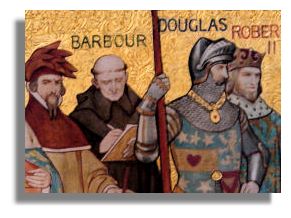
- Barber's Corners - there is a Barberswells in Angus, Barbershall in Dumfries & Galloway and Barberfield in East Lothian. Places featuring the family name Barber are found even more commonly throughout England, however. The Chicago suburb in Will County was named for Captain John Barber of Vermont who arrived in the Bolingbrook area in 1832 and started dairy farming (Aaron Harwig, Encyclopedia of Chicago). According to the House of Names Heraldic website, Barber is a Scottish family name related to Barbour, originating in the English counties along the Scottish border. John Barbour (seen here in the illustration in a gallery of famous Scots) was a poet who wrote "The Brus", a narrative poem celebrating the praises of Robert the Bruce and the Black Douglas.
- Burtons Bridge - there is a Burton in South Ayrshire but places with this name are far more commonly found in both England and Wales.
- Clarkdale - there is a Clark Fell in Dumfries & Galloway, Clark's Sike in the Scottish Borders, Clarkly Hill in Moray, Clarkston in East Renfrewshire and North Lanarkshire and Clarkton in Stirling. Clark occurs even more frequently in English place names The Chicago neighbourhood (part of the community of Ashburn) was named after the developer (Sherry Meyer, Encyclopedia of Chicago). The family name Clark is more English than Scottish, which greatly reduces the likelihood of a Scottish connection in this instance.
- Deer Park (Dumfries & Galloway and Highland) also three places in England and one in Ireland spelt Deerpark. The name is also found in several other American cities. The Chicago suburb, which incorporated in 1957, probably took its name from the Deer Grove Forest Reserve.
- Fairfield (Clackmannanshire, Shetland Islands and Stirling). However, the name is used even more commonly throughout England and is also found in Ireland.
- Forest Hill (a hill in Dumfries & Galloway) but far more likely to be named for one of the many places in England, including the south London suburb.
- Harwood Heights - there are places in the Scottish Borders and West Lothian called Harwood; also Harwood Burn in the Scottish Borders and East Ayrshire, Harwood Moss, Harwood-on-Teviot, Harwood Rig and Harwoodmill in the Scottish Borders, and Harwood Water in West Lothian. Places with Harwood as an element in the name are even more numerous throughout England, especially in the north. According to the Encyclopedia of Chicago, the origin of the suburb's name is uncertain, "but some believe it results from combining parts of the names of Harlem Avenue and Norwood Park Township" (Marilyn Elizabeth Perry). If this is indeed correct then the name would be a combination of Dutch and English elements.
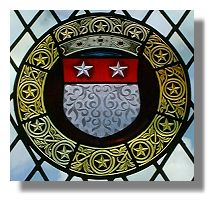
- Morton Grove - there are places in Fife and West Lothian called Morton as well as at least eight places in England. The Chicago suburb was named for Levi Parsons Morton who financed the construction of of single-track line in the 1870s for the Milwaukee Railroad ((Marilyn Elizabeth Perry, Encyclopedia of Chicago). Morton is both a Scottish and an English family name, originating in Cheshire, England. The illustration is of the Coat of Arms of the Scottish Douglas, Earl of Morton.
- Mount Pleasant (Aberdeenshire, Argyll & Bute, Scottish Borders, Dumfries & Galloway, East Ayrshire, Fife, Highland, Moray and Orkney Islands) also all over England, Ireland and Wales as well as Australia, Canada and the USA it would seem.
- North Park (Dumfries & Galloway) also in West Yorkshire, England. The fact that this neighbourhood is located in the far north of the City of Chicago suggests that any connection with either Scotland or England is unlikely.
- Northfield, Northfield Woods and North Northfield - Northfield is a popular place name in Scotland (Aberdeenshire, City of Edinburgh, Dumfries & Galloway, Fife, Highland, Orkney Islands, Scottish Borders and West Lothian); however, this descriptive name seems to be just as popular in England. Since Northfield is situated in the northern suburbs, it is a reasonable assumption that the name is purely descriptive of its location.
- Oakwood Hills - there are at least three places in Scotland called Oakwood (in the Scottish Borders, Moray and Perth & Kinross) but the name is even more common in England.
- Palmer and Palmer Square - there is a Palmer Mount in South Ayrshire. However, there are many places in England featuring this English family name.
- Parkside - there is a Parkside in Aberdeenshire, Angus, North Lanarkshire and Perth & Kinross. Parkside is also a common place name in England and Wales.
- Pikeville - as with so many family names from the British Isles, Pike could be either Scottish or English. Moreover, as a geographic term, Pike (meaning a pointed hill) occurs very frequently in both southern Scottish and northern English place names.
- Porter - there is a Porterstown in both Aberdeenshire and Dumfries & Galloway, Porterfield in Renfrewshire, Porterhall in South Lanarkshire and Porterside in West Lothian. Places with Porter as part of the name are even more commonly found throughout England. The House of Names Heraldic website considers Porter to be a Scottish family name but the name is very common in England as well.
- Preston Heights - there is a place called Preston in Fife, not to mention Prestonpans, the battlesite near Edinburgh. Preston, however, is a very popular place name throughout England. It is also an English and Scottish family name, originating in the English county of Lincolnshire.
- Robert Taylor Homes, Taylors Addition to South Chicago and Tri-Taylor - Taylor is a very common surname in both Scotland and England. A survey of surnames undertaken in the 1970s suggests, however, that it is the 5th most common surname in England compared with the 14th in Scotland. This would result in there being many more English than Scottish Taylors. Regarding the Robert Taylor Homes neighbourhood, Erik Gellman gives the following account in the Encyclopedia of Chicago. "This massive housing project was ironically named after Robert Taylor, an African American activist and Chicago Housing Authority (CHA) board member who in 1950 resigned when the city council refused to endorse potential building locations that would induce racially integrated housing".
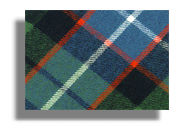
- Russell - there is a Russell Mains in Fife but Russell is far more commonly encountered in place names throughout England and there is also a Russell Hill in Monmouthshire, Wales. Russell is nevertheless a fairly common Scottish surname, a diminutive of 'rous' meaning red. The earliest reference in Scotland to this name is in 1164. The graphic shows the Ancient Russell tartan.
- South Park (Dumfries & Galloway; also Aberdeenshire, spelt Southpark) but the name is far more common in England.
- Spencer - there is a Spencerfield in Fife, but places featuring Spencer are encountered far more frequently in England. Moreover, the family name Spencer is definitely English rather than Scottish.
- The Bush (a water feature in the Orkney Islands) but also the name of two places in England.
- The Cottage (Highland) but the name also occurs in six English counties.
- Thornton and Thornton Junction - there are several places in Scotland called Thornton, in Angus, East Lothian, Fife, Midlothian, Moray, Perth & Kinross and South Lanarkshire; also Thornton Burn in East Lothian, Thornton Hill in Perth & Kinross, Thornton Wood in Fife, Thorntonhall in South Lanarkshire and Thorntonloch in East Lothian. Thornton is used even more commonly in place names throughout England and is also found in Ireland and Wales. The communities in Cook County were named after William F. Thornton, one of the commissioners of the Illinois & Michigan Canal (Dave Bartlett, Encyclopedia of Chicago). Thornton is an English family name from Cheshire, which reduces the chances of a link with Scotland.
- Walker - there are several places in Scotland based on the surname of Walker. The list includes Walkerburn (Scottish Borders), Walkerdales (Moray), Walkerdyke (South Lanarkshire), Walkerhill (Aberdeenshire and Dumfries & Galloway), Walkersknowe (Scottish Borders), Walkerstrough (Moray) and Walkerton (Fife). Walker is found even more commonly in England, especially in the north and is considered to be an essentially English family name. The name of the Chicago suburb in Will County is attributed either to Jesse Walker, an 1820s Methodist preacher from Virginia, or his son-in-law, James Walker, who constructed a sawmill. The area soon became known as Walker's Grove (Aaron Harwig, Encyclopedia of Chicago).
- Woodland Hills - there is a Woodland in South Ayrshire as well as in five English counties.
A final category of neighbourhood and suburban names comprises places that can be found in Scotland, but which, in Chicago's case, definitely or most probably have no connection with Scotland.
- Andersonville and Andersonville Terrace - On the surface, the names of these Chicago neighbourhoods certainly seem Scottish, Anderson being the Lowland form of MacAndrews, which in turn is derived from the Gaelic Mac Ghille Andreis - 'son of the servant of Saint Andrew'. However, according to the Encyclopedia of Chicago, Andersonville began as a Swedish community. Andersson and Andersen are common Scandinavian names, which suggests that the name Andersonville has a Swedish rather than a Scottish origin. The Swedes formed an important part of Chicago's population in the 19th century.
- Barrington, Barrington Center, Barrington Hills, Barrington Woods, Lake Barrington, North Barrington and South Barrington - There is a village in Fife called Barrington. However, Barrington is an English family name, resulting in several places in England with that name. The names of these Chicago suburbs do indeed have an ultimately English rather than a Scottish origin. Barrington, Illinois recalls Great Barrington, Massachusetts from which many of the original farmers came in the 1850s. Great Barrington, Massachusetts was named in turn after the village of Great Barrington in Gloucestershire, England.
- Bellwood (Midlothian). "The village of Bellwood was incorporated on May 21, 1900, taking the name of a second early subdivision, Bellewood" (Patricia Krone Rose, Encyclopedia of Chicago). It seems clear, therefore, that any connection with Scotland is coincidental.
- Belmont, Belmont Gardens, Belmont Heights, Belmont Park and Belmont Terrace - there are places in Scotland called Belmont (Scottish Borders, Shetland Islands and South Ayrshire). However, Belmont is also found in England, Ireland and Wales and was an extremely popular choice of name in all English-speaking countries during the nineteenth century. Its origin is ultimately French or Italian - 'beautiful mountain'. The Chicago neighbourhoods derive their name from Belmont Street, which commemorates the Civil War Battle of Belmont in Missouri in 1861. Any connection with Scotland therefore seems unlikely and would depend on the reason for naming Belmont, Missouri.
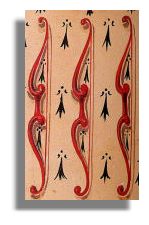
- Bowes - there is a place called Bowes in the Scottish Borders and in East Ayrshire. However, there is also a place with this name in County Durham, England, plus several other places, mainly in northern England, with Bowes as an element in the name. The Earl of Strathmore and Kinghorne has as one of his many titles Baron Bowes but this is an English/UK title. (The graphic shows part of the Bowes coat of arms). The 14th Earl was the father of Elizabeth Bowes-Lyon, the late Queen Mother. No explanation has been found for the name of this Chicago suburb.
- Brookfield (Renfrewshire) but also found throughout England and on the Isle of Man. Originally known as Grossdale, the name of this suburb in Cook County was changed to Brookfield as a result of a contest to choose a new name. "Brookfield" was coined in reference to Salt Creek, which runs through the area (Emily Clark, Encyclopedia of Chicago) and therefore appears to be a made-up name.
- Evergreen Park - there is a place called Evergreen in Moray; however, Evergreen is also found as an element in English place names. The origin of the name of the suburb in Cook County appears to be purely botanical. Betsy Gurlacz, writing in the Encyclopedia of Chicago, explains that "an optimistic real-estate developer, smitten with a vision of the Arc de Triomphe area of Paris, laid out a star-shaped park with eight streets radiating from it. The evergreen trees planted in the park inspired the village's name."
- Garfield Ridge, Garfields, East Garfield Park and West Garfield Park - there is a place called Garfield in East Ayrshire. Garfield, however, is considered to be an English family name first recorded in Northamptonshire. Originally called Central Park, West Garfield Park was renamed in 1881 for President Garfield after his assassination (Amanda Seligman, Encyclopedia of Chicago). The names of these neighbourhoods therefore do not appear to have any Scottish connection.
- Gilberts - there is a Gilberts Rig in Dumfries & Galloway, Gilberts Bridge in Perth & Kinross and Gilbertfield in South Lanarkshire, though Gilbert occurs more commonly in English place names. Gilbert is also a Scottish family name - a sept of Clan Buchanan (along with Gibb, Gibson and Gilbertson). According to Wikipedia, the Chicago suburb was actually named for Albro Gilberts, a settler in the 1840s who established his farm in what is today the centre of the modern community. Gilberts (as opposed to Gilbert) is a French family name, which considerably reduces any connection with Scotland.
- Glendale Heights - Although Glendale is the name of a village in the Scottish Highlands, the name of this suburb in DuPage County is a made-up one. The community was originally called Glendale as it was situated between Glen Ellyn and Bloomingdale, "but after a conflict arose with the small town of Glendale in Southern Illinois, the city decided in March 1960 to add the term Heights, thus becoming Glendale Heights." (Wikipedia). Glen Ellyn is a Welsh name while Bloomingdale has a possibly German origin.
- Greenwood and Mount Greenwood - there are places in the Scottish Borders, Moray and South Lanarkshire with this name but Greenwood is also found in England and in County Mayo, Ireland. The name occurs quite commonly throughout the English-speaking world and was possibly popularised by Robin Hood's forest abode, 'The Greenwood'. As with Evergreen Park (see above), the origin of the name of the Chicago suburb of Greenwood appears to be purely botanical: "Settling on fertile prairies in the 1840s, Yankee farmers named this area after nearby oak groves." (Craig L Pfannkuche, Encyclopedia of Chicago). Similarly, Mount Greenwood was named in 1879 "after the presence of trees on an elevated ridge. It seemed ideally suited for a cemetery." (Clinton E. Stockwell, Encyclopedia of Chicago).
- Hillside (Aberdeenshire, Angus, City of Edinburgh, Dumfries & Galloway, Fife, Inverclyde, Moray, Orkney Islands, Perth & Kinross, Shetland Islands and South Lanarkshire) but just as commonly found in England, sometimes spelt Hill Side, and is also found in Wales. The reason for the name of the Chicago suburb appears to have no link with any particular place in the British Isles. According to the Encyclopedia of Chicago, "the village incorporated in 1905, adopting its name from the Illinois Central Railroad stop, which was called Hillside because the westbound trains had to go uphill at this point" (Patricia Krone Rose).
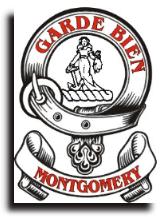
- Montgomery - Although Montgomery/Montgomerie is a Scottish surname (of Norman origin) with its own coat of arms (seen here), and is also the name of a town and former county in mid-Wales (again of Norman origin), the name of this Chicago suburb in Kane County has no immediate connection with either Scotland or Wales. Originally known as "Graytown", Montgomery was renamed for Daniel Gray's home county in New York. Gray's mill still stands as an historic landmark (Sherry Meyer, Encyclopedia of Chicago). The county in New York was named for Revolutionary General Richard Montgomery, who was born in Ireland (Wikipedia). Therefore any connection with Scotland is probably very remote indeed.
- Morgan Park and West Morgan Park - Morgan is a Scottish family name. However, it is a very common Welsh family name as well (Morganstown is a suburb of Cardiff in the former Welsh county of Glamorgan) and the name has also been taken to England, probably by the Welsh Morgans, e.g., Morgan's Hill in Wiltshire. There are two communities called Morgan Park, one in the City of Chicago and the other in Porter County, Indiana. The origin of the name of the Chicago neighbourhood is attributed to the Blue Island Land and Building Company, which in 1869 purchased property from the heirs of Thomas Morgan, an early English settler, and subdivided the area from Western Avenue to Vincennes Avenue (Ellen Skerrett, Encyclopedia of Chicago). There appears therefore to be no Scottish connection.
- Norwood Park and Old Norwood - there is a Norwood in Dumfries & Galloway, but the name is far more commonly encountered in England, including the well-known suburb in south London. Norwood Park, on the other hand, is found only in England. The ethnic origin of the names of these Chicago neighbourhoods is far more likely to be English since they were named after Henry Ward Beecher's novel 'Norwood, or Village Life in New England', published in 1868 (Wikipedia article on Norwood Park, Chicago).
- Old Town (Aberdeen City and City of Edinburgh; also Old Town Burn and Old Town Covert in the Scottish Borders) but found far more commonly in England and Ireland. Amanda Seligman, writing in the Encyclopedia of Chicago, gives the following explanation of the origin of the name: "The name Old Town, evoking a cozy, neighborly spirit, persisted when residents concerned about the area's physical deterioration formed the Old Town Triangle Association [OTTA] in 1948. OTTA's activities inspired urban renewal throughout Lincoln Park." There appear to be two communities with this name: the Chicago neighbourhood and a neighbourhood of the suburb of Algonquin.
- Riverside and North Riverside - there is a Riverside in Stirling but the name is a common one in England and is also found in Wales. The name of the Chicago suburb is most probably purely descriptive of the community's situation on the Des Plains River.
- South Holland - there is a place called Holland in the Orkney Islands and several places in England as well. However, the name of this suburb clearly reflects the fact that the community began as an enclave of Dutch farmers, founded in 1846 (Jonathan J. Keyes, Encyclopedia of Chicago). Holland is a province of the Netherlands.
- Turner Camp - Turner occurs relatively frequently in Scottish place names (Turnerhill in East Ayrshire, Turner Cleuch Law in Scottish Borders, Turner's Monument in Dumfries & Galloway, Turnerhall in Aberdeenshire and a place simply called Turner in Stirling). However, Turner as part of a place name is very common throughout England as well as Scotland while Turner as a surname is far more English than Scottish. According to the Encyclopedia of Chicago, Turner Camp takes its name from the fact that turnvereins (associations of turners and related tradesmen) in Northern Illinois joined together in the 1910s to build a camp in Cary as a vacation spot for members and their families. If anything, the name has German connotations.
- Warrenhurst and Warrenville - there is a place in Angus called Warren, as well as places in both England and Wales. Place names beginning with Warren are found very commonly throughout Britain and in Ireland. Those in Scotland include Warren Wood (Aberdeenshire), Warrenhall (Orkney Islands) and Warrenhill (South Lanarkshire). As a surname, however, Warren is considered to be of English origin. The Chicago suburb of Warrenville in DuPage County was named for either Julius Warren, who built a tavern in 1838, or his father Daniel, who claimed land in what is now McDowell Woods (Wikipedia).
- Whiting - there are places in Scotland called Whiting Ness (Angus), Whiting Bay (North Ayrshire) and Whiting Point (Orkney Islands) but there is also a Whiting Hole in Devon, England. According to John Bodnar, the Indiana settlement of Whiting "dates to 1871 when a post office was established at the place where 'Old Pap Whiting', a conductor on the Lake Shore Railroad, had wrecked his train". (Encyclopedia of Chicago). Whiting is an English family name from Devon, which would greatly reduce the chances of a connection between the name of this Indiana community and Scotland.
- Woodstock (Orkney Islands) but also found in England and Wales. Craig Pfannkuche, writing in the Encyclopedia of Chicago, explains that in 1845, Woodstock, formerly known as Centerville, adopted its current name after the Vermont birthplace of early settler Joel Johnson. According to Kenny (1984), Woodstock in Vermont was named for the village of Woodstock in Oxfordshire, England. There is therefore no evidence of a link between Woodstock, Illinois and Woodstock in the Orkney Islands. It is also apparent that the Chicago suburb was not named for the title of one of Sir Walter Scott's novels.
Other place names in Greater Chicago that have a mild "Scottish ring" about them but that have not yet been established as having a connection with Scotland include:
There is a far stronger case for listing the suburb of Kenilworth and the three communities called 'Sleepy Hollow' as indirectly having Scottish connections. The name Kenilworth "was taken from a town in the midlands of England. In 1899 the local women's club selected, and the village adopted, street names such as Abbotsford and Essex, taken from Sir Walter Scott's novel Kenilworth" (Jan Olive Nash, Encyclopedia of Chicago). It is not clear whether the suburb of Kenilworth was actually named for the town in England or for Sir Walter Scott's novel (the setting of which was in the English town). 'Sleepy Hollow' probably would not exist today as a place name had it not been coined by Washington Irving, the famous Scottish American author.
Other evidence of Scottish influences on Chicago's toponymy can be found in the names of some its golf courses such as Bonnie Brook (Waukegan), Brae Loch (Wildwood), Elgin Country Club (Elgin), Glen Flora (Waukegan) and Gleneagles Country Club (Lemont). Some examples of parks and reserves with Scottish names are Bell Park, Dunbar Park, Grant Park, Kelvyn Park and Skinner Park in the City of Chicago, and the Balmoral Park Race Track, Forsyth Park and MacDonald Woods Forest Reserve in the suburbs. There is even a small lake in Mundelein called Loch Lomond while a statue of Scotland's national poet, Robert Burns, stands in Garfield Park. A brief account of the impact of Scottish immigrants on Chicago can be found in the Encyclopedia of Chicago.
Acknowledgements:
Aldine Square, Burbank, Corwith, Forest Glen, Ingalls Park, Ingalton, Ingleside, Ingleside Shore, Niles, Oakglen, Peterson Park and Trumbull Park Homes.
According to the House of Names Heraldic website, Aldine is said to be both a Scottish family name from East Lothian (a variant of Haldane) and an English family name from Lancashire (a variant of Holden). Black (1996), the authority on Scottish family names makes no mention of the name, however. Black is also silent in regard to Burbank, Corwith, Ingall, Niles and Trumbull, names which are attributed to Scotland in the heraldic website. For instance, Burbank is supposedly a variant of Birkbeck, first found on the English side of the border in Westmorland while Corwith is said to be a variant of Curwen, another name from the border region that could be either Scottish or English. Theoretically, Peterson Park could be Scottish but in Chicago's case is far more likely to be Swedish.
- Black, George F. (1996). The Surnames of Scotland. (Birlinn Ltd, Edinburgh).
- Chicago & Vicinity Regional Map (Rand McNally, 2000).
- Chicago Park District website.
- Encyclopedia of Chicago Online.
- House of Names Heraldic website.
- Illinois Lincoln Highway Coalition website.
- Kathleen Blaze Brown, Flossmoor, Illinois for information on the derivation of the name Flossmoor.
- Kenny, Hamill (1984). The Place Names of Maryland: Their Origin and Meaning. (Maryland Historical Society, Baltimore).
- Mapquest.com for the names of outlying commuter ('bedroom') communities.
- Room, Adrian (2003). The Penguin Dictionary of British Place Names. (Penguin Books, London).
- Scarlett, James D. (1975). The Tartans of the Scottish Clans. (Collins, Glasgow and London).
- Thorne, J.O. & Collocott, T.C. (Editors) (1974). Chambers Biographical Dictionary (Revised Edition). (W & R Chambers, Edinburgh).
- Village of Glenview website.
- Wikipedia articles on the City of Chicago and selected suburbs for lists of some their neighbourhoods.
- Websites, place name gazetteers and published Ordnance Survey maps of British and Irish cities, towns, villages and counties.
© Ian Kendall
If you wish to contact Ian about his research, his e-mail address is ian.kendall1@bigpond.com.
Melbourne, Australia, October 2007



